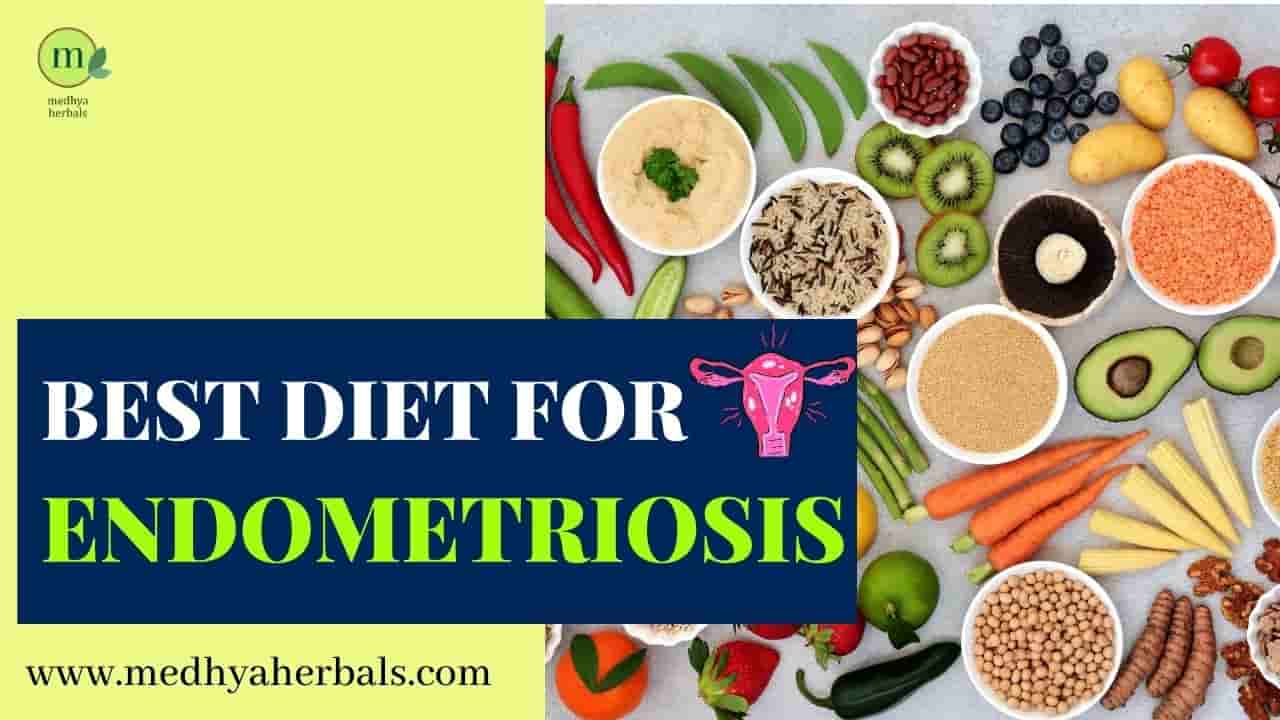Endometriosis is a gynecological condition in which the endometrial tissue (tissues that are similar to the endometrium, the uterine lining) starts to grow outside of the uterine cavity. This abnormal growth of endometrial tissue is termed as endometrial lesions or endometrial implants.
Endometrial tissues often disturb the normal functioning of the body organs to which they start sticking to. This also bleed every month creating severe pain and inflammation in the body.
An anti inflammatory endometriosis diet, in particular, has been shown to be highly effective in reducing endometriosis pain and promoting healing.
In this post, you will learn about the best and worst foods for natural endometriosis treatment. You can also download Endometriosis diet chart in pdf format to help you follow a healthy meal plan going forward.
What is Endometriosis?
Endometrial implants can range in size and frequently take the form of nodules or cysts (also known as endometrial cysts or chocolate cysts). While the majority of them are brown, black, or blue colored, sometimes they can also be red, white, or clear.
Endometriosis symptoms include severe menstrual cramps, abnormal bleeding, pelvic pain, and difficulty becoming pregnant.
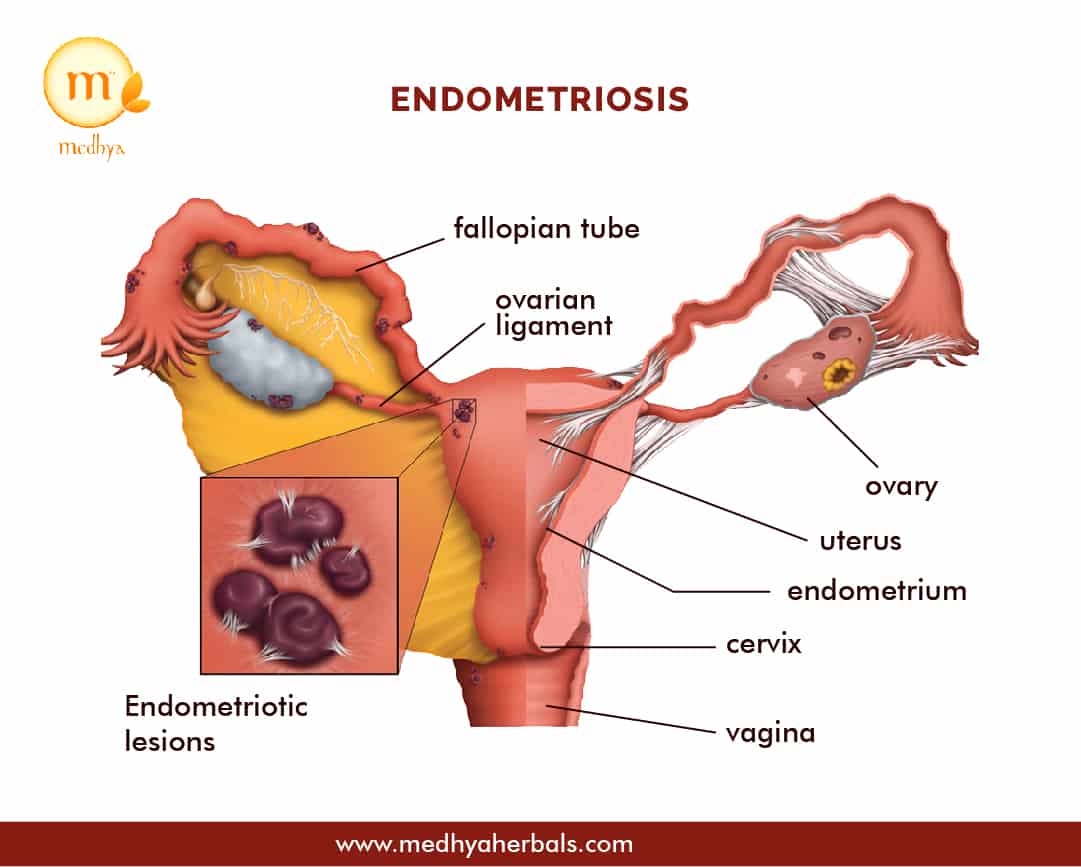
Endometriosis Symptoms
Endometriosis should be considered in any woman (of reproductive age), who experiences severe pelvic pain that lasts for more than 6 months.
This chronic pelvic pain is usually non cyclical in nature, meaning it keeps on changing in intensity and duration.
Also, the pain experienced in endometriosis is not limited to menstruation. It can happen at anytime during the menstrual cycle.
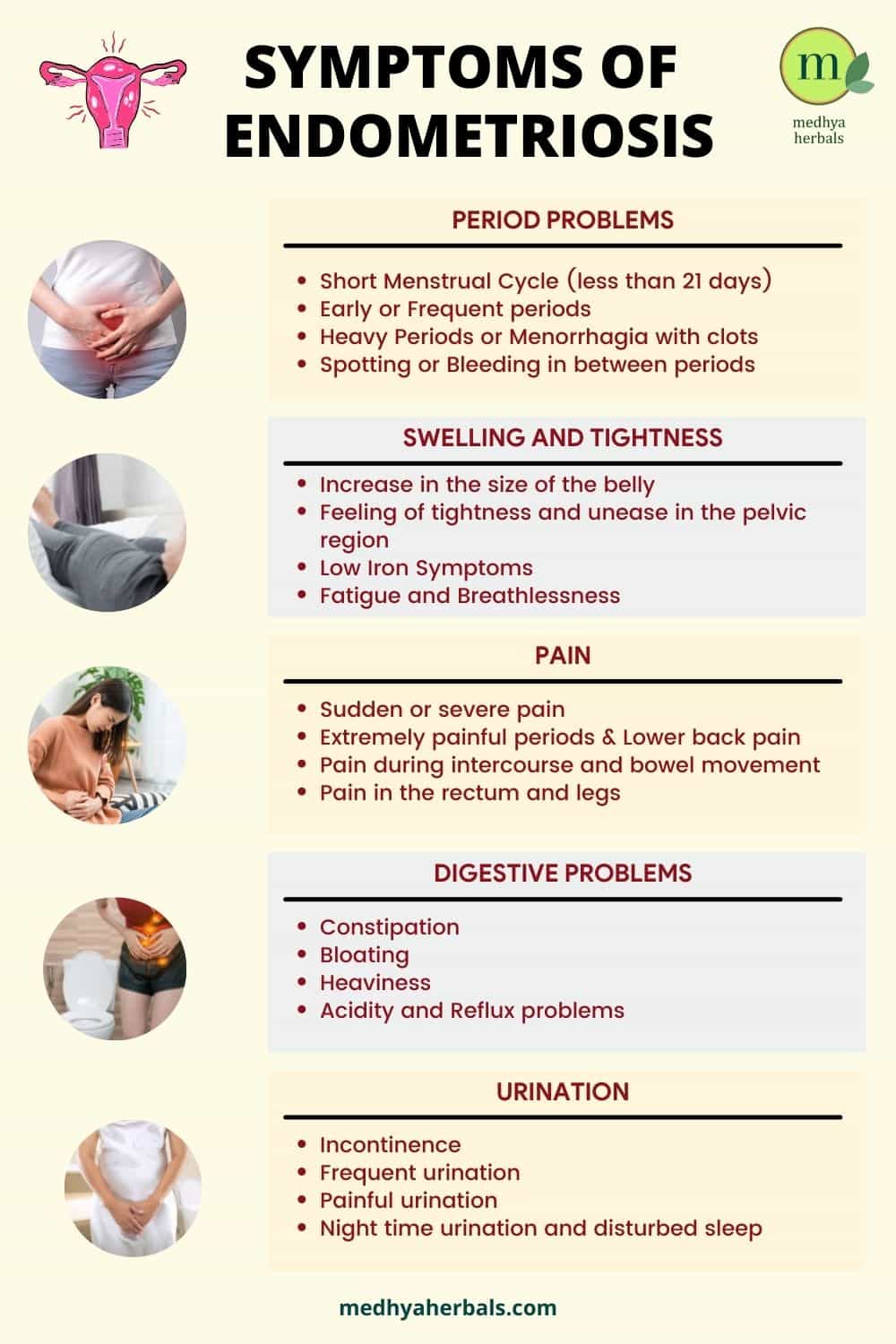
Apart from the pain, here are the symptoms that one experiences in Endometriosis:
- Severe period cramps. The diagnosis of endometriosis should be considered especially, if a patient develops painful periods after years of pain-free menstrual cycles
- Excessive pain or cramping is experienced during sexual intercourse
- Lower back pain that worsens during menstruation
- Pain in the rectum and painful bowel movement may occur depending on the location of the endometrial implants
- Repeated miscarriages, infertility and inability to conceive
- Pain during urination, passage of red urine (during menstruation)
- Short Menstrual Cycle (less than 21 days) leading to Early or Frequent periods
- Heavy Bleeding or Menorrhagia
- Clotted menstrual blood flow
- Spotting or Bleeding in between periods
- Fatigue
- Nausea and vomiting
- Poor Mental Health leading to Emotional Distress, Anxiety, Depression, and Mood Swings
- Digestive issues such as gas, bloating, stomach pain (endo belly), diarrhea or constipation that worsens during menstruation
- Fever
Endometriosis is an estrogen dependent condition, so many treatments focus on reducing excess estrogen levels.
Importance of Diet to cure Endometriosis without surgery
If you are suffering from Endometriosis, a hysterectomy is not your only option. Ayurveda offers effective natural treatment for Endometriosis. In Ayurvedic treatment, your diet plays an important role to prevent and remove Endometriosis from the body along with herbal medicines.
By following a healthy diet, women with Endometriosis can help to improve their symptoms, reduce the size of the abnormal growths and prevent further progression of the condition. Specifically in the initial stages, your diet can really help to prevent and treat Endometriosis at the root cause level.
For later stages of Endometriosis involving extensive growth, your diet will not only help to reduce the pain but it will also help to save you from health complications of Endometriosis.
Endometriosis diet should be rich in antioxidants, vitamins and minerals to balance the hormones, boost fertility and reduce inflammation in the body.
A healthy diet chart can go a long way to prevent progression of Endometriosis, provide relief from painful symptoms and naturally treat the condition.
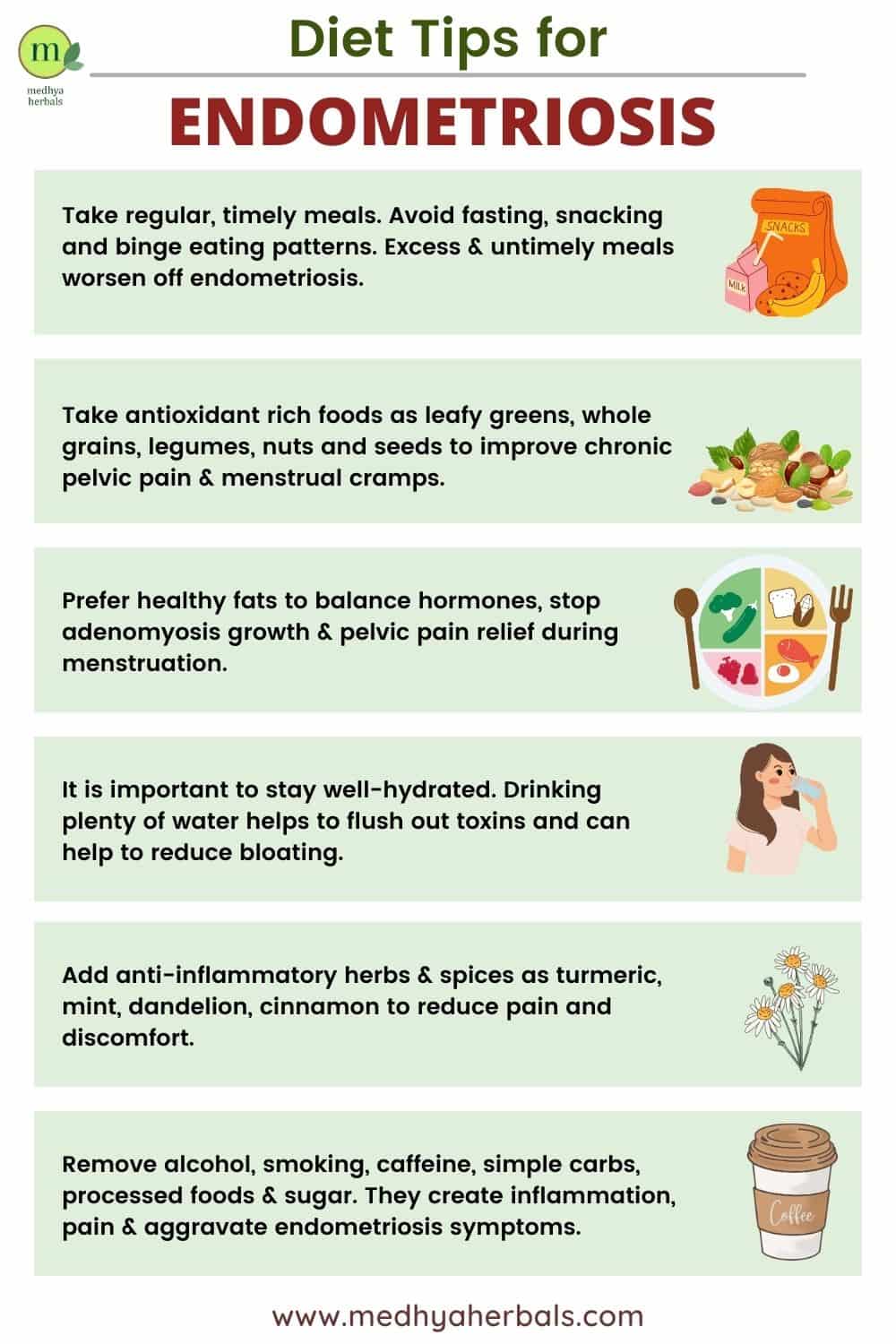
Best Foods for Endometriosis Diet
Ayurvedic doctors recommend a diet that consists of freshly prepared meals made from wholesome natural ingredients such as vegetables, whole grains, beans and greens.
Omega 3 Fats
Foods that are rich in omega-3 fatty acids, such as seeds, nuts, healthy oils and fatty fish such as salmon and other cold-water fish, are particularly beneficial for pain relief. These fatty acids help to balance the hormones, stop the growth of Endometriosis and help with pelvic pain during menstruation.
Anti-inflammatory Foods
Foods such as leafy greens, whole grains, legumes, nuts and seeds are all excellent anti-inflammatory foods that can help to improve chronic pain, menstrual pain, and pain during sexual intercourse.
Fiber rich Foods
Estrogen is an integral hormone; however, excessively high levels of estrogen can exacerbate endometriosis-related pain and cramping. Let food and fiber be your rescuers in this situation! Eating sufficient fiber daily can assist in regulating your bowel movement and eliminate extra estrogen from the body through stools.
Chronic constipation may lead to an excessive amount of estrogen in your system, so it is paramount that you actively prevent this by incorporating more fiber into your diet. You can do this easily by adding these foods:
- Fruits and vegetables, but eat the whole food and avoid juice.
- Ground flaxseed, which you can add to smoothies or home-baked foods.
- Legumes, like beans, lentils and chickpeas.
- Whole grains, like brown rice and quinoa
While increasing your fiber intake is key, be sure to do so incrementally. Too much all at once can lead to bloating, gas and other digestive discomforts. Gradually increase the amount of fiber in your diet while ensuring you’re adequately hydrated – this will help minimize any adverse effects on your body.
Foods rich in vitamin C
Vitamin C is a powerful antioxidant that can help to protect the body against the damaging effects of free radicals. Free radicals are known to contribute to the development of Endometriosis. Foods such as oranges, grapefruits, kale, broccoli and Brussels sprouts are all excellent sources of vitamin C.
Foods rich in Iron
Iron is essential for the production of hemoglobin, which carries oxygen in the blood. A lack of iron can lead to anemia, which can make the symptoms of Endometriosis worse. Foods such as leafy green vegetables, legumes, nuts and seeds are all good sources of iron.
Foods rich in Magnesium
Magnesium is a mineral that has been shown to have a number of health benefits, including the ability to reduce inflammation. Foods such as banana, pumpkin seeds and quinoa are all excellent sources of magnesium.
Water Intake and Hydration
In addition to an anti-inflammatory diet, it is important to stay well-hydrated. Drinking plenty of water helps to flush out toxins and can help to reduce bloating. Herbal teas, such as chamomile and ginger tea, can also be helpful in reducing inflammation.
Spices and Herbs
In addition, certain herbs and spices such as turmeric, mint, dandelion and cinnamon have anti-inflammatory properties that can help to reduce pain and discomfort.
Develop Awareness of Your Own Body
If you are looking for the best diet to support your endometriosis symptoms, look no further than tuning into what your body is telling you. Keeping a food journal and tracking how certain foods make you feel for a period of 14-30 days can give insight on which diets work best for you. If anything causes pain or unease after eating it, simply remove from your meal plan!
Foods that make Endometriosis worse
It’s important to note that everyone is different and what may trigger pain for you may not for another. That said, here are some foods that have been linked to worsening inflammation in those with endometriosis. These include, but are not limited to, processed foods, sugar, saturated fat, and alcohol.
- Processed foods are high in salt and sugar, which can lead to inflammation. In addition, processed foods often contain lot of chemicals that mimic the function of estrogen in the body.
- Sugar can also cause inflammation, and it can also feed the growth of abnormal tissue. Sugar can also feed the growth of yeast in the body, which can lead to further irritation.
- Saturated fat is known to increase inflammation throughout the body. This can worsen the symptoms of Endometriosis and may even lead to further progression of the condition. Saturated fat is found in animal products, such as red meat, pork, and dairy. It is also found in processed foods, such as cookies, cakes, and chips.
- Alcohol is also a trigger for inflammation. It is also disturbs the health of the liver and affects the functioning of endocrine glands. So, if you are suffering from Endometriosis, it is best to avoid and limit your alcohol consumption.
- Caffeine can also make Endometriosis worse. It is a diuretic and can lead to dehydration, which can then trigger inflammation.
- Red meats are also a trigger food. They are high in saturated fat and can cause inflammation. In addition, they are often difficult to digest, which can also lead to inflammation.
- Unhealthy oils and refined fats as margarine, canola oil and soybean oil can make Endometriosis worse.
- Dairy products such as cheese, condensed milk and sweetened yogurts are one of the biggest triggers for Endometriosis. They are heavily processed and can cause inflammation. In addition, they contain hormones that can further disrupt the delicate balance in the body.
- Gluten is a protein found in wheat, rye, and barley. It can be difficult to digest and can cause inflammation. In addition, gluten is often found in processed foods, which can also trigger Endometriosis symptoms.
- Food additives such as MSG, a flavor enhancer that is often added to processed foods. It is an excitotoxin that can overstimulate the cells and lead to inflammation. Aspartame is an artificial sweetener that is often used in diet drinks and foods. It is a neurotoxin that can cause inflammation and may even trigger an autoimmune reaction. Sodium nitrite is a preservative that is often added to processed meats, such as bacon and lunch meat. It is a known carcinogen and can also cause inflammation.
By avoiding trigger foods and eating plenty of anti-inflammatory foods, you can help to reduce the symptoms of Endometriosis and even prevent the condition from worsening.
Endometriosis Diet Chart
Here is an example of an anti-inflammatory diet that can help to reduce the symptoms of Endometriosis:
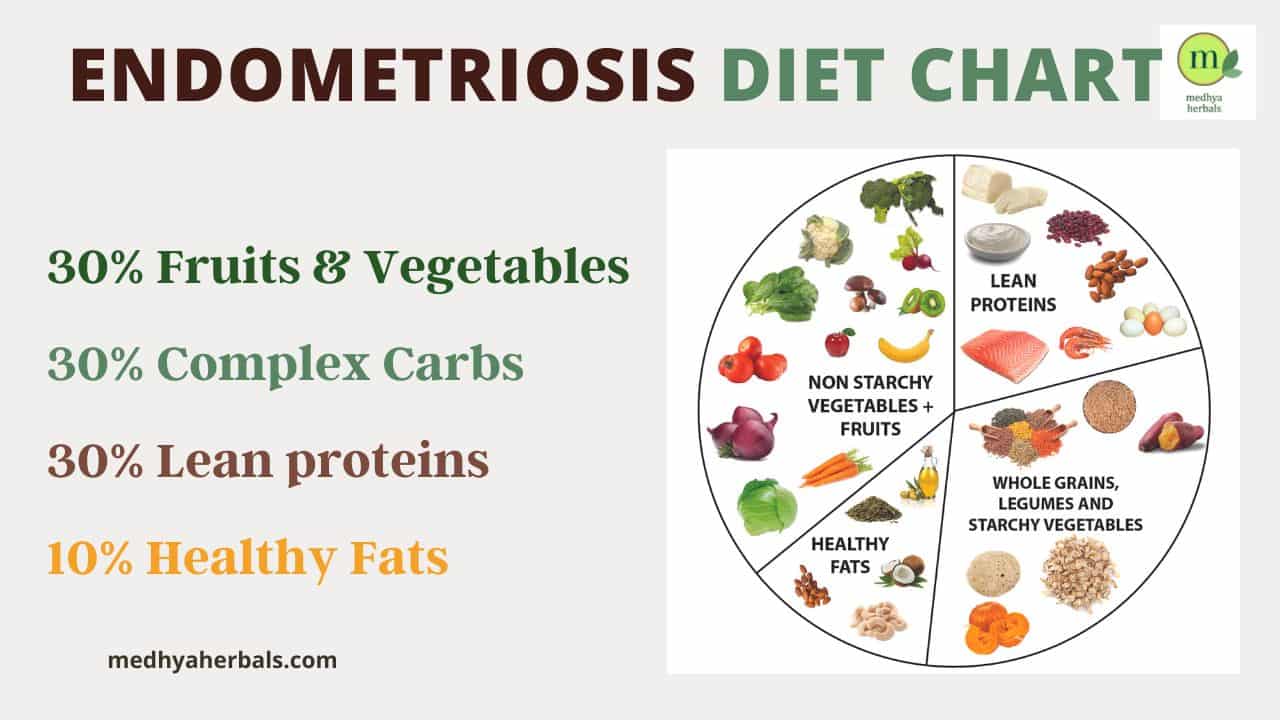
Macro nutrient Proportions
- 30% Meal Portion should be Fruits, vegetables, and fiber-rich foods.
- 30% Meal Portion should be Complex Carbs as Whole grains, cereals, and starch-based food products
- 30% Meal Portion should be Lean proteins such as lentils, beans, fermented soy products
- 10% Meal Portion should be Healthy Fats
Breakfast
- Omelet with spinach, mushrooms, and onions
- Oatmeal with nuts and dried fruits
- Organic yogurt with berries and flaxseed
- Smoothie with greens, herbs, banana, and honey
- Scrambled Eggs with Herb muffins
Lunch
- Salad with greens, avocado, and grilled chicken
- Soup with lentils, kale, and quinoa
- Sandwich with hummus, cucumber, and tomato on whole grain bread
- Brown Rice with Greens Stir-fry and Lentils soup
- Fried Rice with vegetables and curd
Dinner
- Grilled salmon with steamed broccoli and brown rice
- Roasted Brussels sprouts with roasted sweet potato and grilled chicken
- Vegetarian chili with black beans, tomatoes, and onions
- Thai green Curry with Brown Rice
- Miso Soup with Jasmine Rice
Healthy Snacks for Endometriosis Diet
Add on these healthy snacks in between your meals should you need to. It will help you to keep you your hunger levels in check while supporting hormone balance:
Roasted Black Gram
Nuts and dried fruits (limited amount)
Sprouts
Berries
Handful of sunflower seeds or pumpkin seeds
Hummus and fresh vegetables as celery or carrots
Cucumber slices
Lemon water or coconut water
Apple Beets and Celery Juice
Fresh slices of coconut
As you can see, there are plenty of anti-inflammatory foods that you can eat to help reduce the symptoms of Endometriosis. By following an anti-inflammatory diet, you can help to prevent the condition from worsening and even improve your overall health.
Takeaway
If you suspect that you may be suffering from Endometriosis, it is important to speak with your doctor. They will be able to confirm the diagnosis and recommend the best course of treatment.
In advanced stages of Endometriosis, surgery may be necessary to remove the abnormal tissue. However, in majority of the cases, herbal medicinal supplements, diet and lifestyle changes can help to effectively manage the condition.
Getting Help You Need
Endometriosis is a very specific condition that should be addressed in an individualized manner. Before you exclude certain foods from your diet, please make sure to consult with a medical professional and adjust any meal plan according to the unique requirements of your own body and symptoms.
Below you can download Endometriosis Diet Chart pdf version for reference. If you need further support to follow the diet plan or considering Ayurvedic treatment to manage or treat Endometriosis Naturally, do contact us here, we will help you out.
FAQ
1. How can I cure my Endometriosis without surgery?
Endometriosis is an incredibly complicated disorder that requires a holistic approach to treatment. One of the most important steps in managing endometriosis is following an endometriosis diet. Eating foods high in anti-inflammatory nutrients can help reduce endometriosis symptoms and help heal endometrial lesions. Some of the best endometriosis diet foods include omega-3 fatty acids, plant-based proteins, antioxidant-rich fruits and vegetables, herbs like turmeric and ginger, B vitamins, magnesium and iron-rich foods. However, it's important to maintain a balanced diet with plenty of lean proteins, complex carbohydrates, healthy fats and limited processed sugars or refined grains which can worsen endometriosis symptoms and overall health. Additionally, making diligent lifestyle modifications such as reducing stress levels through activities such as yoga and mindful meditation will also benefit endometriosis patients both physically and mentally.
2. Is exercise good for Endometriosis?
Endometriosis is a medical condition that affects the uterus. The main symptom of Endometriosis is excessive menstrual cramps, pain in the pelvic area, bloating, and fatigue. Exercise is often recommended as a way to reduce the symptoms of Endometriosis. While there is no cure for Endometriosis, exercise can help to reduce the severity of symptoms and improve overall quality of life. Regular exercise helps to increase blood flow to the pelvis, which can help to reduce pain and inflammation. Exercise also helps to reduce stress levels, which can trigger or worsen symptoms of Endometriosis. In addition, exercise can help to improve sleep quality and reduce fatigue. For these reasons, exercise is often recommended as a way to manage the symptoms of Endometriosis.
3. Can endometriosis go away with diet?
Endometriosis is a chronic condition that affects many women's reproductive health. Diet is an important factor when it comes to healing endometriosis. An endometriosis diet should focus on adding plenty of fresh, whole foods to your meals and avoiding processed, high fat and salty ingredients. Ayurvedic doctors recommend starting with increasing your intake of vitamin B6-rich foods such as rolled oats, brown rice, sunflower seeds, and bananas; dark leafy green vegetables like spinach and kale; anti-inflammatory herbs and spices such as turmeric and ginger; omega 3 fatty acids from sardines, salmon, or flaxseed oil; and dietary fiber from fruits, vegetables, legumes, nuts, and whole grains. In addition to specific endometriosis diet guidelines recommended by Ayurvedic doctors like myself, getting good sleep and managing stress levels can also be effective measures in fighting the condition itself.
4. What vitamins help with Endometriosis?
The question of what vitamins help with Endometriosis is a difficult one to answer definitively, as each person's individual biochemistry can play a role in how well they absorb and utilize various nutrients. However, there are some vitamins and minerals that have been traditionally used to help regulate menstrual bleeding and relieve pain associated with Endometriosis. These include iron, magnesium, calcium, vitamin E, and the B-complex vitamins. While there is no cure for Endometriosis, these nutrients can help to ease symptoms and improve overall health. As always, it is best to consult with a qualified healthcare practitioner before beginning any new supplement regimen.
5. What happens if Endometriosis is left untreated?
Left untreated, endometriosis has the potential to cause a host of long-term health issues. Beyond pain, endometriosis can lead to infertility and digestive problems such as irregular bowel movements and irritable bowel syndrome. It can also compromise the function of organs like the bladder, ovaries, and umbilicus as well as disrupt menstruation cycles and increase cancer risk in certain cases. In traditional Ayurvedic practice, diet, lifestyle adjustments such as yoga and meditation have all been shown to improve symptoms of endometriosis significantly. Nevertheless, it is important that all women seek regular checkups with their gynecologist so that they are continually aware of any new changes or patterns related to this condition. Going beyond the traditional medicines offered in many Western approaches, Ayurvedic doctors specialize in addressing root imbalances within the body so that a natural balance can be restored from within.
Reference
Experiences of health after dietary changes in endometriosis: a qualitative interview study

